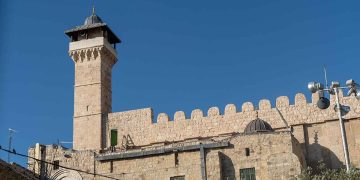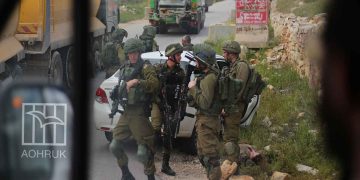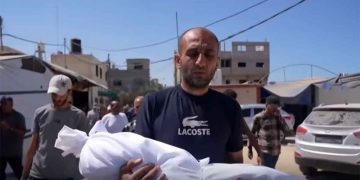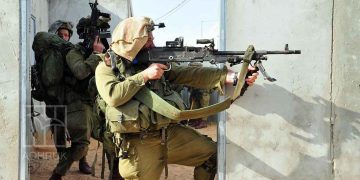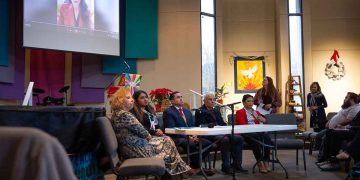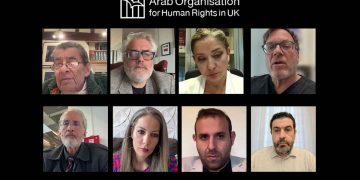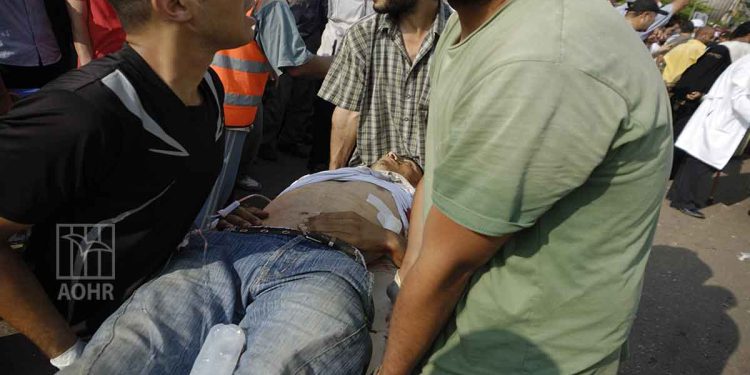Today marks the ninth anniversary of the Rabaa Al-Adawiya massacre, one of the largest mass murders in Egypt in modern times.
The massacre that was ordered by order of Abdel-Fattah El-Sisi, Egypt’s current president, resulted in the killing of more than 1,100 people, including women and children, as well as the injury and arrest of thousands, including at least 37 people who went missing since then.
The disgraceful silence of the international community until now has enabled perpetrators of this massacre to escape punishment and encouraged them to commit more crimes against the opposition and those calling for change or reform until this day.
The mass massacres in Raba Al-Adaweya, Al-Nahda and a number of Egyptian squares, where opponents of the military coup held their sit-ins, came to announce the emergence of a bloody, repressive regime that would kill thousands in order to stabilize its power.
This day’s massacres were not the only ones, as it was followed by a number of other horrific massacres, killings, arbitrary arrests and enforced disappearances by the regime. There are nearly 60,000 detainees in Egyptian prisons held for having opposing views, while perpetrators of mass murder, torture, killing, and enforced disappearance enjoy the freedom and full impunity.
For 9 years, the Egyptian regime has tried to absolve itself and hold the victims accountable. In order to circumvent and avoid international demands to open an investigation into the crime, the regime has formed two local committees to investigate the events, one by the National Council for Human Rights – a quasi-governmental institution – and the other by a presidential decision to investigate the events. Both reports held the protesters responsible for the crimes while limiting the police violations to administrative and procedural errors, and both did not refer to any presence of the army forces which played the main role in the massacre.
These reports were in line with the production of several T.V shows by the regime, which aimed to falsify the recent history -whose witnesses are still alive-, obliterate the truth, and paint a false image, viewing peaceful sit-ins as places full of armed terrorists, while security forces appear to be self-defending themselves and forced to use minimal force.
Nevertheless, these reports and drama productions have never succeeded in changing the reality proven by hundreds of peremptory evidence, testimonies, videos, official medical reports, and burial permits, in addition to the number of those killed and the type of their injuries – mostly in the head and heart- and the use of the most lethal weapons, and deliberate killing of women, journalists. All this evidence proved the deliberate use of lethal force by the Egyptian security forces against the protesters.
The regime’s decision to commit that massacre came after huge incitement campaigns in the Egyptian media, which demonised the protesters and labelled them as terrorists in preparation for the crime and to prevent possible popular rage that might occur in the aftermath of the massacres.
The Egyptian judiciary was directly involved in the crime, as it refrained from the beginning of the events of July 2013 until now from opening any investigation into any of these mass killings. It is also responsible for issuing the dispersal decision in July 2013 by the former Egyptian Public Prosecutor Hisham Barakat, hours after submitting a request to that effect from the Egyptian Ministry of Interior.
For 9 years, the United Nations has failed to take any action to investigate this crime, while international demands to investigate these crimes have gradually decreased. After the mild international condemnation of the massacre, relations with the Egyptian regime resumed successively, despite its ongoing commission of crimes on a daily basis.
On the ninth anniversary of this heinous massacre, AOHR UK continues to call on all civil society organisations, activists, journalists, media professionals and politicians and human rights defenders around the world, to remember the victims of this massacre, who have not been able to seek redress so far. It also called on them to put pressure on the international community to take serious stances against the current Egyptian regime, which has committed the most heinous crimes and continues to enjoy impunity.

